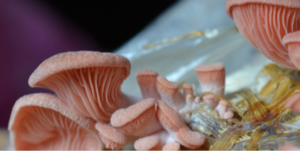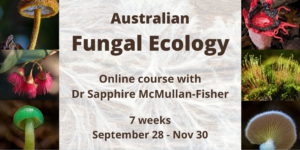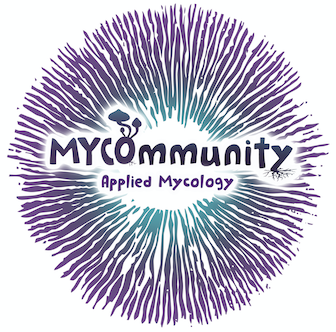
For latest courses and dates please visit https://myco.tidyhq.com/public/schedule/events
Mycology 101
This online course covers the fundamental aspects of mycology and fungal ecology. Classes will be live and recorded for people to re-watch later.
- Fundamentals of biology
- Fungal diversity and different types of fungi
- How to identify fungi
- Roles of fungi in the ecosystem including as decomposers and
- How fungi interact with other organisms including relationships with plants and animals
The course will run for 7 weeks and each class is around 1-1.5 hours long including Q and A. The classes will be on Thursday evenings from 6:00pm-7:30(ish)pm
Your teachers
Ema Corro is a founding member and coordinator of Mycommunity Applied Mycology. She has over a decade experience cultivating mushrooms and has researched mycomaterials and their properties at RMIT. Her main area of interest is fungal ecology and how it relates to land management and has contributed to the Fungi for Land project. She also has experience using environmental DNA to monitor fungi. She is currently studying a Master of Environmental Science and Management at UNE looking at using fungivorous animal scats to promote mycorrhizal fungi and plant-health in revegetation areas.
Emily McIntyre is a graduate of a Masters of Ecosystem Management and Conservation, where her thesis explored the effect of biotic and environmental variables on soil fungi across an elevational gradient. She is currently undertaking a PhD at the University of Melbourne, where she is studying the diversity and ecology of hypogeous fungi in south-eastern Australia. Her research explores the distribution and diversity of these fungi and their mutualistic relationship with the endangered Long-Footed Potoroo. She is also currently undertaking research through MYCOmmunity's Wild Fungi DNA Project to examine the effect of storm damage on soil fungi within Wombat Forest. Emily is most interested in learning about the interactions that fungi have with plants, animals, and abiotic factors, to better understand how ecosystems function.
Melvin Xu Researcher at University of Melbourne on Entomopathogenic fungi, Vice President & volunteer at MYCOmmunity and Coordinator of the Fungi Group of Field Naturalist Club Victoria. Working in Council, Landcare, and volunteer groups, begun his home propagation from his own Australian Native Terrestrial Orchids and their symbiotic fungi. With his own stock of fungi and seeds hope to develop new protocols to include fungi into local nursery and future conservation of native Orchids.
Discounts
Anyone who signs up for this course is entitled to discount prices on other courses in the series including:
- Human uses for fungi and growing fungi
- Fungal conservation, land management and citizen science
- Fungal ecology
We provide scholarships to people who can't afford the full price of ticket. Get in touch if you need this at mycommunity@myco.org.au
For more info email mycommunity@myco.org.au
MYCOmmunity is an NFP and all profits from these courses help keep our community lab open and fund citizen-science projects.
The course will run for 8 weeks and each class is 1-1.5 hours
We are running this as a separate course as we are approaching the end of the year. However anyone who signs up for this course is entitled to discount prices on other courses in the series including:
- Human uses for fungi and growing fungi
- Fungal conservation, land management and citizen science
The classes will be on Thursday evenings from 6pm-7:30pm

Australian Fungal Ecology (no date currently scheduled)
with Sapphire McMullan-Fisher
from Fungi4Land www.fungi4land.com
Dates: most Wednesday evenings 6:30-7:30 pm online from 28 Sept to 30 Nov 2022
This Australian focused Fungal ecology course will lead you through the roles fungi play in terrestrial ecosystem. This includes:
- As recyclers of nutrients
- Partnering with other organisms like mycorrhizal associations with plants.
- Fungi in soils and as part of Biocrusts
- Biosecurity and understanding problem fungi
- Animal interactions
- Fungal responses to fire
- Integrating fungi into indigenous ecosystem restoration
- Fungi conservation including global IUCN RED list fungi
Recordings will be available for a limited time incase people miss a session or want to revise.
About Sapphire:
Sapphire is an ecologist who has special interest in the conservation of biodiversity, particularly the macrofungi and mosses. She did her doctorate at the University of Tasmania on ‘Surrogates for cryptogam conservation – associations between mosses, macrofungi, vascular plants and environmental variables.’ In 2018 with Roz Hard and many Australasian Mycologists and amateurs in ‘love’ with fungi, started the project to develop a land management book for Australian Fungi with the working title Fungi4Land. Sapphire has been involved with many Australian fungi groups including MYCOmmunity, QMS and Fungimap. She is a representative on International Union for Conservation of Nature (IUCN) Species Survival Commission (SSC) Specialist Groups: Species Monitoring and Mushroom, Bracket and Puffball. She is also active with Australian scientific groups like the Education Subcommittee of the Australasian Mycological Society, Australian Bryophyte Workshops and community groups including many Field Naturalist Clubs and Landcare groups and Australian Plants Societies. To read more about her research profile in Research Gate and LinkedIn.
Although this course is stand alone, if you want to get a more rounded understanding of fungi including fungal basics like biology, and applied subjects like culturing & growing mushroom we encourage you to take MYCOmmunity's online mycology and other courses.
Next running time
TBA - later in 2023
